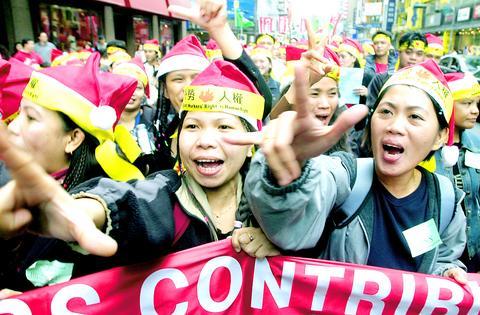Foreign migrant workers took to the streets of Taipei yesterday to fight for better treatment from the government, their employers and employment agencies.
"The Council of Labor Affairs [CLA] has made many promises regarding our basic rights for many years, but has yet to deliver on its promises," said Ellen Panaligan, a Filipino domestic helper who has been working in Taipei for two years.
About 600 Thai, Vietnamese, Indonesian and Filipino migrants along with representatives from several Christian groups and labor unions gathered at the 228 Peace Park and marched toward Taipei Railway Station.

PHOTO: SEAN CHAO, TAIPEI TIMES
"There are four main requests we are petitioning for today," said Reverend Peter O'Neil, director of the Hope Workers' Center in Taoyuan County.
"The first is asking the CLA to re-include foreign workers under the protection of the Labor Standard Law (
The Hope Workers' Center was founded to assist needy foreign migrant workers in Taiwan. It helps more than 70,000 foreign workers a year.
According to O'Neil, in 1998 the CLA included foreign migrant workers in the Labor Standard Law, which aims to protect the basic rights of employees. For instance, the law specifies that the total number of working hours shall not exceed 48 per week, while overtime hours have to be strictly recorded and paid by employers.
"However, after foreign workers had been included in the law, employment agencies and employers started to file complaints about the hassle of keeping track of overtime hours and asked the CLA to exclude foreign workers from the law. As a result, in January 1999, foreign workers were once again deprived of their rights. Right now, there is no law to protect them at all." O'Neil said.
O'Neil also pointed out that many of the migrant workers that call his center for help have been overworked or physically abused by their employers.
"Many migrant workers work 16 to 18 hours a day and can't get overtime pay. Furthermore, many workers are not given any days off each week. Some female domestic helpers are even raped or physically abused by their employers. These workers are not only victims of the Taiwanese legal system but also victims of physical and sexual abuse," O'Neil said.
Panaligan participated in the protest in part to fight for the fair treatment of female domestic workers.
"My employer treats me very well. However, two Indonesian domestic workers in my building have been sexually abused by their employers. One has already asked for help from a counseling center that assists foreign workers, while the other dares not to say a word to the authorities because she is afraid of being repatriated and losing her job," Panaligan said.
O'Neil also pointed out that criminal cases against employers who have abused migrant workers are too time-consuming.
"We have a case where a female domestic worker has been staying in our shelter for over two years. She is almost blind now as a result of being physically abused and raped by her employer. Her employer recently received an eight-year prison sentence but has filed an appeal, which means the case is still open. It is not uncommon that cases against abusive employers drag on for years," O'Neil said.

SECURITY: As China is ‘reshaping’ Hong Kong’s population, Taiwan must raise the eligibility threshold for applications from Hong Kongers, Chiu Chui-cheng said When Hong Kong and Macau citizens apply for residency in Taiwan, it would be under a new category that includes a “national security observation period,” Mainland Affairs Council (MAC) Minister Chiu Chui-cheng (邱垂正) said yesterday. President William Lai (賴清德) on March 13 announced 17 strategies to counter China’s aggression toward Taiwan, including incorporating national security considerations into the review process for residency applications from Hong Kong and Macau citizens. The situation in Hong Kong is constantly changing, Chiu said to media yesterday on the sidelines of the Taipei Technology Run hosted by the Taipei Neihu Technology Park Development Association. With

CARROT AND STICK: While unrelenting in its military threats, China attracted nearly 40,000 Taiwanese to over 400 business events last year Nearly 40,000 Taiwanese last year joined industry events in China, such as conferences and trade fairs, supported by the Chinese government, a study showed yesterday, as Beijing ramps up a charm offensive toward Taipei alongside military pressure. China has long taken a carrot-and-stick approach to Taiwan, threatening it with the prospect of military action while reaching out to those it believes are amenable to Beijing’s point of view. Taiwanese security officials are wary of what they see as Beijing’s influence campaigns to sway public opinion after Taipei and Beijing gradually resumed travel links halted by the COVID-19 pandemic, but the scale of

A US Marine Corps regiment equipped with Naval Strike Missiles (NSM) is set to participate in the upcoming Balikatan 25 exercise in the Luzon Strait, marking the system’s first-ever deployment in the Philippines. US and Philippine officials have separately confirmed that the Navy Marine Expeditionary Ship Interdiction System (NMESIS) — the mobile launch platform for the Naval Strike Missile — would take part in the joint exercise. The missiles are being deployed to “a strategic first island chain chokepoint” in the waters between Taiwan proper and the Philippines, US-based Naval News reported. “The Luzon Strait and Bashi Channel represent a critical access

Pope Francis is be laid to rest on Saturday after lying in state for three days in St Peter’s Basilica, where the faithful are expected to flock to pay their respects to history’s first Latin American pontiff. The cardinals met yesterday in the Vatican’s synod hall to chart the next steps before a conclave begins to choose Francis’ successor, as condolences poured in from around the world. According to current norms, the conclave must begin between May 5 and 10. The cardinals set the funeral for Saturday at 10am in St Peter’s Square, to be celebrated by the dean of the College